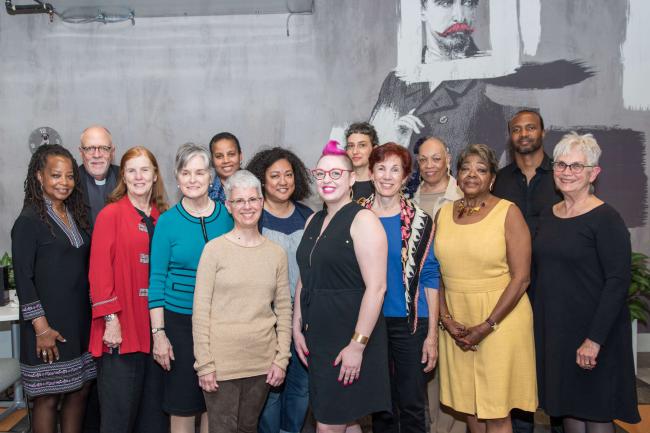WASHINGTON – The Howard University Department of Communication, Culture and Media Studies (CCMS) has been awarded a HumanitiesDC Vision Grant of $20,000. The grant will support their research throughout D.C. neighborhoods for a project titled, “Communicating Across Cultures in a Changing City.” The department’s research team will produce a series of work through May 2020. The faculty and doctoral students will facilitate a series of small-group conversations with D.C. residents about the city’s cultural history, and explore how aggressive development and changes in emerging communication technologies impact racial divides among residents.
“The HumanitiesDC Vision Grant moves our research closer to the communities most affected by gentrification,” says Carolyn M. Byerly, Ph.D., professor and chair, Department of Communication, Culture & Media Studies (pictured far right in the front row).
“The grant will let us learn how people think about and cope with huge changes to their neighborhoods through small-group discussions between new and established neighbors. At the same time, we'll be able to create a documentary and other materials to leave a public record. We're especially excited that our doctoral students will be fully involved, working with local residents in this project. The grant advances work in understanding gentrification that we began five years ago in our classrooms. . . now we are taking those classrooms more fully into the community.”
Howard University’s Department of Communication, Culture and Media Studies plans to partner with D.C. residents to produce a discussion guide that will be housed in local libraries, on the website of the Interactivity Foundation, and within the DC Digital Museum database. These discussion guides will be made available to schools, churches, advisory neighborhood commissioners and other institutions that have an interest in the subject. The department will convene a series of small-group forums to engage D.C. residents on cultural stratification and information ecology in Washington, D.C. Each forum will serve as the opportunity for facilitators to document community concerns and strategize to create alternatives for fostering understanding and communication between neighbors.
"We are thrilled and grateful for HumanitiesDC's support for this critical and timely conversation about how to bridge the rich cultural traditions--new and old--that are thriving in communities in our nation's capital,” says Natalie Hopkinson, Ph.D., assistant professor, Department of Communication, Culture and Media Studies.
“As our city evolves, conflicts and tensions draw the most headlines, but this kind of intentional, sustained dialogue will help us to move forward together and strengthen our communities. We can't wait to get started, and we welcome other partners to join in this effort.”
# # #
(Pictured (far right in front): Carolyn M. Byerly, Ph.D., professor and chair at Howard University with other HumantiesDC 2019 Vision grantees - courtesy of HumanitiesDC)
About HumanitiesDC
HumanitiesDC is the State Humanities Council for Washington, DC, and one of 56 such institutions found in every state and territory of the United States, each affiliates of the National Endowment for the Humanities. Founded in 1980, our mission is to: enrich the quality of life, foster intellectual stimulation, and promote cross-cultural understanding and appreciation of local history in all neighborhoods of the District through humanities programs and grants. To learn more, visit: www.wdchumanities.org
About Howard University
Founded in 1867, Howard University is a private, research university that is comprised of 13 schools and colleges. Students pursue studies in more than 120 areas leading to undergraduate, graduate and professional degrees. The University operates with a commitment to Excellence in Truth and Service and has produced four Rhodes Scholars, 11 Truman Scholars, two Marshall Scholars, one Schwarzman Scholar, over 70 Fulbright Scholars and 22 Pickering Fellows. Howard also produces more on-campus African-American Ph.D. recipients than any other university in the United States. For more information on Howard University visit www.howard.edu
Media Contact: Imani Pope-Johns, Imani.popejohns@howard.edu





